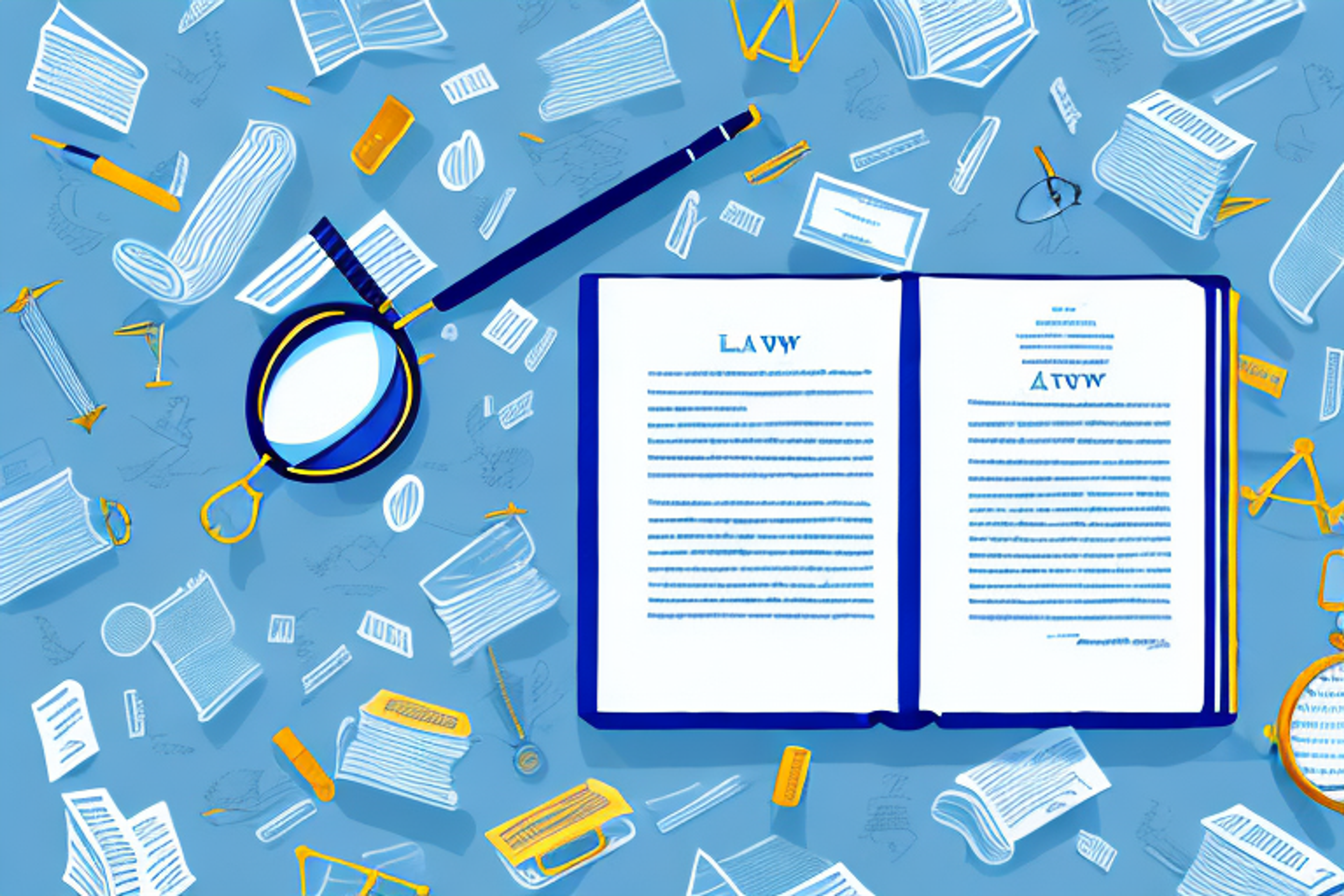The Role of Case Briefs in Law School Success
Learn how case briefs can be a game-changer in your law school journey.
Posted June 13, 2025

Join a free event
Learn from top coaches and industry experts in live, interactive sessions you can join for free.
Table of Contents
Law school can be a daunting and challenging experience, with a heavy workload and demanding expectations. One of the key tools that law students can use to navigate this terrain is the case brief. In this article, we will explore what case briefs are, why they are important, and how to write effective ones that can ultimately contribute to success in law school and beyond.
What are case briefs?
Case briefs are concise summaries of legal cases that highlight the key facts, legal issues, reasoning, and holdings. They are often written by law students as a way to help them understand and analyze cases they are studying in class or for exams. Case briefs typically include the parties involved, the procedural history, the facts, the legal issues, the relevant laws or precedents, the holding of the court, and the rationale behind the decision.
Case briefs are an essential tool for law students to develop their analytical and critical thinking skills. By summarizing complex legal cases into concise and organized briefs, students can better understand the legal principles and reasoning behind court decisions. Additionally, case briefs can be useful for legal professionals who need to quickly refresh their memory on a particular case or legal issue. Overall, case briefs are an important aspect of legal education and practice.
Why are case briefs important for law students?
Case briefs can serve several important functions for law students. First, they can help students better understand and retain the material they are studying. By distilling complex legal concepts and arguments into concise summaries, case briefs can help students identify the key points and arguments in a case, and how they relate to wider legal principles and doctrines. This can also contribute to better analytical and critical thinking skills, as students learn to identify the strengths and weaknesses of legal arguments.
Second, case briefs can be useful for exam preparation. By having a collection of well-written briefs, students can review and study them as practice material for exams. This can help them identify patterns and trends in legal arguments, as well as practice applying legal principles to new scenarios.
Third, case briefs can have practical applications for future legal practice. By developing skills in summarizing and analyzing cases, law students are preparing themselves for the kind of work they will encounter in legal research, writing, and advocacy. The ability to quickly and accurately identify key points, arguments, and precedents in a case can be invaluable in a variety of legal contexts.
Fourth, case briefs can also help law students develop their writing skills. By summarizing complex legal arguments into concise and clear language, students can improve their ability to communicate effectively in writing. This can be particularly useful for future legal professionals who will need to write briefs, memos, and other legal documents.
Fifth, case briefs can also help law students develop their teamwork and collaboration skills. By working together to create briefs, students can learn to communicate effectively, delegate tasks, and work towards a common goal. These skills are essential for success in the legal profession, where teamwork and collaboration are often necessary to achieve positive outcomes for clients.
How to write effective case briefs?
Writing effective case briefs involves several key steps. First, students should carefully read and analyze the case they are summarizing, paying close attention to details and nuances. They should then identify the key facts, legal issues, and holding, as well as any relevant legal doctrines or precedents. This information should be summarized in a clear and concise manner, using appropriate legal terminology and style.
It is also important to note the different types of case briefs and their purposes. For example, issue briefs may focus primarily on the legal issue or question at stake, while factual briefs may provide more detailed information about the parties and circumstances involved. Knowing the purpose and scope of a brief can help students write more effective and relevant summaries.
Finally, it is crucial to avoid common mistakes when writing case briefs. These may include summarizing too much or too little information, failing to identify the key legal issues or reasoning, or simply copying and pasting from other sources without proper attribution or understanding.
Another important aspect of writing effective case briefs is to understand the audience for whom the brief is intended. Depending on the context, the brief may be written for a judge, a professor, or a client. Understanding the audience can help students tailor their writing style and level of detail to meet the specific needs and expectations of the reader.
Additionally, students should consider the broader context and implications of the case they are summarizing. This may involve researching related cases or legal developments, and considering how the case fits into the larger legal landscape. By providing this additional context, students can demonstrate a deeper understanding of the legal issues at stake and the potential impact of the case on future legal decisions.
The benefits of writing case briefs for law students
There are several benefits that students can derive from writing case briefs. First, as noted above, it can help them better understand and analyze legal cases, which in turn can lead to greater retention and mastery of legal concepts. Second, writing case briefs can also help students develop important legal research and writing skills, including the ability to identify relevant sources, analyze and synthesize information, and write clearly and persuasively.
Third, writing case briefs can contribute to better class participation and engagement. By having a solid understanding of the cases being discussed in class, students are better positioned to ask and answer questions, contribute to discussions, and make connections between different legal concepts and cases.
Fourth, writing case briefs can also help students prepare for exams. By summarizing and analyzing cases, students can create a useful study tool that can be used to review and reinforce legal concepts. Additionally, the act of writing case briefs can help students identify areas where they may need additional study or clarification.
Fifth, writing case briefs can also be a valuable networking tool. Sharing case briefs with classmates or professors can lead to discussions and debates, which can help students develop relationships and connections within the legal community.
How to use case briefs for exam preparation?
As mentioned earlier, case briefs can be an effective tool for exam preparation. One key strategy is to create a collection of well-written briefs that cover the material being studied in class. Students can then review and study these briefs, testing their knowledge and comprehension of legal concepts and principles.
Another useful approach is to practice applying legal principles to new scenarios, using hypothetical fact patterns or problem sets. By using case briefs as a reference point, students can develop their ability to apply legal reasoning and analysis to new situations, which can be crucial in a variety of legal contexts.
Additionally, case briefs can also be helpful in preparing for class discussions and participation. By reviewing and analyzing the key points of a case, students can better understand the legal concepts and arguments presented. This can lead to more informed and insightful contributions to class discussions, which can in turn enhance the learning experience for all students.
Furthermore, creating case briefs can also be a valuable exercise in developing strong writing skills. By summarizing complex legal concepts and arguments in a concise and clear manner, students can improve their ability to communicate effectively in writing. This can be particularly useful in legal practice, where clear and persuasive writing is essential.
The impact of case briefs on legal analysis and reasoning skills
Writing case briefs can have a significant impact on legal analysis and reasoning skills. By engaging in close reading and analysis of legal cases, students are developing the ability to identify key legal issues, analyze legal arguments, and apply legal principles to specific fact patterns. This can contribute to better critical thinking and analytical skills, as well as an improved understanding of legal concepts and doctrines.
In addition to improving critical thinking and analytical skills, writing case briefs can also enhance legal writing skills. By summarizing complex legal cases in a concise and clear manner, students are developing the ability to communicate legal concepts effectively. This can be particularly useful in legal practice, where clear and concise writing is essential.
Furthermore, writing case briefs can also help students develop their legal research skills. In order to write a comprehensive case brief, students must conduct thorough research on the legal issues and principles involved in the case. This can help students become more proficient in legal research, which is a crucial skill for any legal professional.
Tips for organizing and managing your case briefs efficiently
Organizing and managing case briefs can be a daunting task, particularly if students have a large collection of them. However, there are several strategies that can help. One is to use a consistent format or template for briefs, which can make it easier to compare and contrast different cases. Another is to use software tools or apps that can help organize and categorize briefs, allowing students to easily search and retrieve them as needed.
Finally, students should consider collaborating with peers to create comprehensive and diverse collections of briefs. By sharing and exchanging briefs, students can benefit from different perspectives and approaches, as well as develop a broader understanding of legal concepts and principles.
The ethics of using other people's case briefs or summaries
While sharing and exchanging case briefs can be beneficial, it is important to consider the ethics of using other people's work. Plagiarism and academic misconduct are serious ethical and legal violations, and should be avoided at all costs. Students should always give proper attribution to sources, and should never copy or reuse material without permission or understanding. It is also important to note that using other people's briefs or summaries may not always be the most effective way to learn legal concepts, as it can lead to a superficial or incomplete understanding of the material.
How to stay motivated and engaged while writing and reviewing your own case briefs
Finally, it is important to stay motivated and engaged while writing and reviewing case briefs. One approach is to set achievable goals and deadlines, and to break up large tasks into smaller, more manageable ones. Students can also seek feedback and support from peers and professors, as well as taking breaks and practicing self-care to avoid burnout.
Ultimately, case briefs can be a powerful tool for success in law school and beyond. By developing the skills and habits of effective case briefing, students can enhance their understanding of legal concepts and principles, improve their legal research and writing skills, and become better prepared for future legal work and advocacy.
Browse hundreds of expert coaches
Leland coaches have helped thousands of people achieve their goals. A dedicated mentor can make all the difference.

















